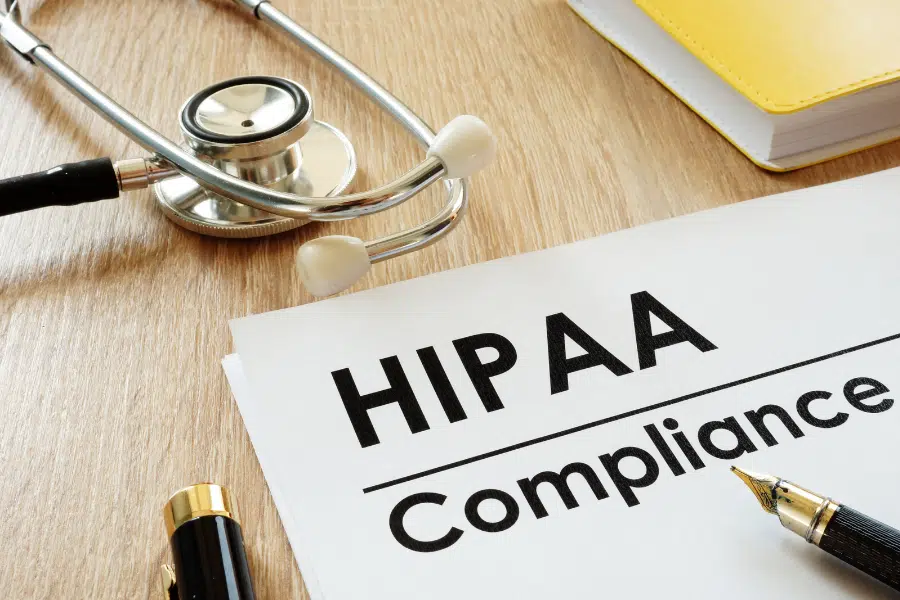
Patients are more empowered than ever to make informed healthcare decisions with on demand access to countless resources online. With this convenience, there is a catch. Patients may share personal data without realizing it. or lack understanding of the risks involved. Responsible handling of patient health information (PHI) security must include considerations for a medical practice website’s role in data capture.
Why Websites Need to Be HIPAA Secure: A Refresher
Medical websites are one of those touchpoints in the patient journey where PHI (or ePHI) can be transmitted. Examples of sensitive patient data are medical conditions, information regarding appointments, billing information, or other personal details.
Whether stored on paper, digitally, or verbally communicated, the Health Insurance Portability and Accountability Act (HIPAA) outlines the responsibilities of how covered entities handle the PHI they collect. Though it may seem like your website is peripheral to your practice operations, in the scope of PHI, it is considered to be part of your practice.
Is My Medical Website HIPAA-Secure?
A web design agency may promise that your medical practice website is HIPPA-compliant, but what does that mean? This question calls for a transparent explanation. While agencies to create and host websites may be convinced that its client services infrastructure is ironclad, storing any PHI in a website’s files or website server removes that additional – and critical – layer of protection.
PHI may be collected in forms, trackers, and more. It takes one – just one – PHI data collector to go from compliant to non-compliant. For medical website PHI protection to be truly vigilant, it must store and transmit any patient health information elsewhere so it can be encrypted and protected. Directing any patient data capture to a more secure platform – like a patient portal – is the best way to protect PHI.
Bottom line, to have a website that fulfils the objectives of HIPAA, it needs to be as protective of PHI as possible, and that means knowing exactly what information is captured via website, where that information ends up, and who has access to it. To keep PHI out of the wrong hands, it cannot be stored on vulnerable websites, and it cannot be accessible by those with no legitimate reason to view it such as subcontractors.
What is a Safe Website?
The internet is a risky terrain, so it is everyone’s responsibility to be careful and take steps to protect themselves, their workplace, and patients in medical practices. Just having basic security measures does not exactly make a website HIPAA-secure, but all websites, whether related or not to healthcare, should be protected with security best practices.
- Does your website have an SSL certificate? A tell-tale sign of having used the wrong web design service is if the most basic website security is missing. Your medical practice’s website URL should begin with HTTPS rather than HTTP. Use encryption where necessary. The safest way to handle PHI is to not store it on your website’s server at all, but in cases where forms or other data capture elements are present on your website, encryption is necessary to ensure that transmission from your website to a more secure platform (such as your EHR) is not left vulnerable.
- Select a dependable web hosting and web design firm. The best web design agency for a medical practice will have a deep understanding of the intricacies of responsible healthcare management and will also provide a website that meets current industry standards for internet security.
Again, due diligence for HIPPA compliance means that your medical practice is fully aware of where the PHI ends up when patient use of the practice’s website is involved. It cannot be stored anywhere that is not protected or accessible by others on the internet. Any PHI collected must be where all other PHI is safely stored such as your EHR or patient portal.
How Does a Medical Practice Make Its Website More PHI-Secure?
Medical practices routinely reassure patients that they are in a safe and comfortable environment, so knowing that their information is safe on your website brings peace of mind for both practice and patient.
Step 1: Work With Website Agencies Who Know Healthcare
Your medical website is in the best hands when it is being managed by those who understand healthcare regulations, can explain what they are doing, why they are doing it, and how they are protecting your best interests as a client. To protect your practice and your patients, third parties assisting you with the website must be vetted.
Avoid working with agencies who:
- Are unaware or not transparent about where your website is being hosted and where your website files are being kept
- Cannot ascertain that they know where captured patient data ends up
- Use overseas subcontractors for website work or management
- Refuse to sign a business associate agreement (BAA)
- Are vague, and cannot answer specific questions about how they follow HIPAA and keep PHI secure
Step 2: Know Who Has Access to PHI
Responsible management of your website means full awareness of who or what can access data supplied by patients. For example, a website agency may use offshore contractors for some website management. For the protection of your patients and your practice, always know where patient data is stored and accessed from.
Awareness of trackers on the internet is also necessary for responsible handling patient information on the internet. Medical practices must do their due diligence to protect patients from trackers.
Step: 3 Periodic Sweeps
Knowing for sure that no patient data is being stored is to routinely inventory your website’s files and data collection processes. Regular audits of these files and folders gives your practice the peace of mind that PHI is not inadvertently stored where it should not be.
Awareness is essential to HIPAA compliance. The goal is to be confident in knowing how patient data is collected, where it goes, where patient data is stored, and who has access to your data, both PHI and website files.
Summary: A Medical Practice’s Responsibility to Keep a Website Secure and HIPAA-Compliant
The consequences of non-compliance with HIPPA are broken trust with patients, a damaged reputation, and significant fines. Websites are valuable tools for patient engagement, but with this healthcare access point comes the responsibility to keep PHI secure with vigilance. Medical practices must include website security in their HIPAA-compliance plan. Here is a checklist of website and PHI management best practices:
- Ensure that all data transmission is secure and be aware of tracking activity between your website and others such as Facebook.
- Never keep electronically captured patient data on your website, but instead have your website set up to direct storage to appropriate platforms such as the patient portal or your EHR.
- Routinely audit to ensure that no patient data is being stored on the website or with its files
- Only hire reputable website design and hosting services
- Ask plenty of questions when working with a third-party to confirm that your website operations are handled responsibly and in recognition of HIPAA guidelines
- Keep access to PHI restricted to those who should have access (in other words, third party website services should not have any access to your PHI without a BAA and a business purpose)
- Have basic security features for your website including SSL certificates and encryption
Healthcare Digital Marketers Are Here to Help You Maintain a Secure Website
Every practice needs a website, as it is part of the digital front door that is instrumental in today’s virtual patient journey. This means medical practices will have to choose a website design agency to create an engaging website. The right website design agency will understand the gravity of healthcare regulations and what safeguards are necessary to protect a practice and its patients from harm. Our digital marketing agency is here to answer any questions you may have about website hosting servers, BAA contracts, or the current quality of your current medical practice website protections.


